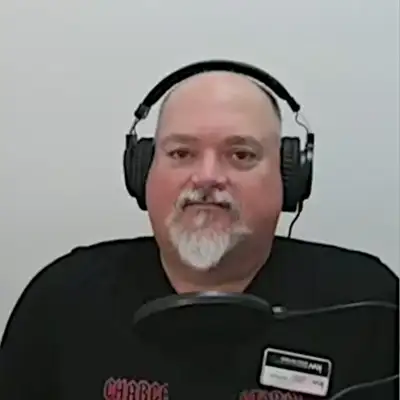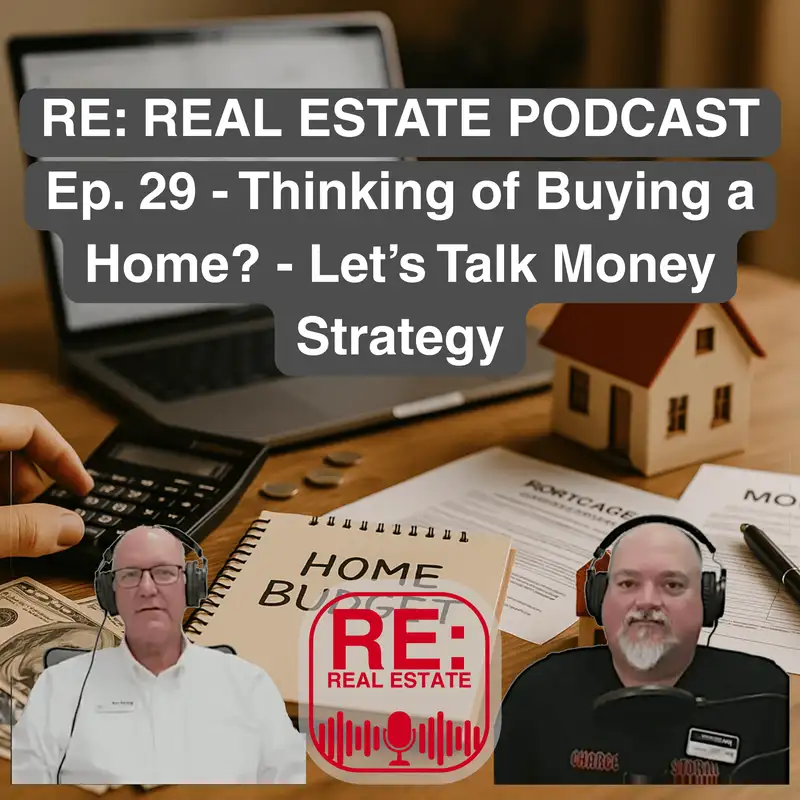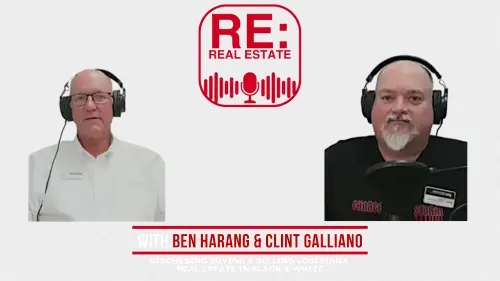Ep. 29 - Thinking of Buying a Home - Lets Talk Money Strategy
Clint C. Galliano, REALTOR® (00:14)
Welcome to another episode of RE Real Estate Podcast. I'm your host, Clint Galliano and we are sans Ben Harang He's on European vacation.
So for this episode, we're going to be talking about a question that I get a lot as when I'm working with buyers of what do I need to do as a buyer to buy a house? And how do I get prepared? So, know, of the titles I'm looking at for this is thinking about buying a house. Let's talk money strategy.
So this is how to set yourself up to be able to buy a house. Or better yet, how to buy a home. So you're not going to hear me going too hard on the phrase, First Time Home Buyer. I don't like that. I feel it's overused. We commonly get the question, can I have one of those First Time Home Buyer programs?
Pretty much every program is a first-time homebuyer program. Generally, the most common loans used, especially in this area, are FHA and Rural Development. And those are specifically to help first-time homebuyers because of the low down payment or no down payment. So it makes it a little bit easier for the homebuyer to get into the home.
your conventional loans while the, I guess the common thought is you need 20 % to put down to buy a home. That's a typical rate for a conventional loan, but it could be all the way down to as low as 1 % with special programs. So it just depends on who the lender is. So we're gonna start out,
talking about the mental shift. All right. So it's a financial decision first. Yeah, you know, it's emotional. You know, you want to, well, buying a home will make you feel good and also make you nervous, depending on how comfortable you are with it. But the goal isn't to be perfect. It's to be prepared to make smart choices. So if you think about it,
When you're renting, it's temporary thinking. Buying's long-term. So when you're renting, you're paying somebody else's mortgage. And if you rent for 10 years, that's 10 years of paying for something that you don't have. It's like renting a hotel room for 10 years. Because at the end of the 10 years, you're out whatever money it costs you.
and you don't have anything to show for it.
when you buy a home.
you depending on how you buy it, if you're putting money down or if you're buying it at below market value, you could potentially have equity built in at the time of purchase. And as you pay down your loan, you're growing more equity. So you've got that going for you on top of
potential appreciation of your property, which means that the value of your property goes up over time. Now there's some key things that are involved with that. That'll be like keeping it maintained, keeping it repaired. That'll help to ensure that your home appreciates the value of it. But those are the kind of the key differentiators.
You know, so I guess the main difference between renting and buying is that renting drains your finances where buying builds your finances.
So next step is talk about what lenders look for.
So the lenders will look at your credit score, your debt to income ratio, and your income stability. So those are kind of the three main buckets of things that they look at.
Credit score is, you you've got your basic ranges, but most lenders won't go below a 580 credit score to lend money. And a lot of lenders will have overlays on that to where if you want the best rates, you need to have higher credit scores. Because if your credit score is lower,
then they consider that more of a risk and actually charge higher interest rates on it. So the best way to get the best rates is to work on your credit score and get that up. And pretty much anything up to 700 or better, 720, you're in great shape there.
So, but as low as 640, you can still get a good deal and just about anybody will approve you with a credit score like that. Next is debt to income ratio. So those are a little more, I guess, nuanced depending on the loan type you're using. Some of the...
GSE or government sponsored entity loans will go up to a 50 % debt to income ratio, but ideally you want to be down below 30 % and preferably below 30 % and ideally less than 10 % because that's definitely sitting pretty there. And then the income stability on
just a, if you punch a time clock, you know, they'll be looking for two years of pay stubs, payment history. Doesn't necessarily have to be at the same job as long as it's the same type of job. If it's salaried, then that's closer to a year that they're looking for for income stability. So those are the main things that they look at.
All right. Next one. This topic is near and dear to my heart is when do you talk to a real estate agent?
Somebody somewhere said, one of the smartest things you can do early on is talk to a real estate agent. Even if you think you're a year away from buying. And it's true. You know, I'd, I'd be more than happy to sit down and have a conversation with you and give you advice. Basically advise you on steps to take to get prepared to purchase a home.
because we know what's involved and we can point you in the right direction. A lot of people look at foreclosed homes and then think that they can get a loan for that. The homes that meet the criteria that will qualify for a loan that are foreclosed on are few and far between. And there is a bunch of red tape involved. So unless you've got a big chunk of cash,
It's probably better if you look at something that's not a foreclosure home. So, Good Agent isn't just about showings. They can help connect you with lenders or loan officers. They can give you realistic price ranges based on your market. So that's another thing. know, a lot of people will come into this market and be approved for...
a price range or have a pre-approval that in this market, it would be impossible to find a property that qualifies at that budget because their pre-approval is so low that finding anything that will meet the appraisal guidelines for that type of loan at that price range. So we can help decipher that.
And we can also break down how offers and closing costs work and what's involved, what the steps are in the purchase process, and how to set yourself up for the smoothest possible transactions. And then as we've talked about over the last few episodes, if we do run into any snags,
we can figure out how to get that handled.
money wise getting prepared to buy a home.
You want to have cash on hand because that puts you in the best position. Depending on the market that we're in or you're in, if you've got cash on hand, that gives you options because you're going to need three buckets of money. All right. First bucket of money is a down payment. If you're using a loan that requires a down payment,
then you're definitely going to need that. There are options that don't require down payments and depending on your situation, they have other advantages. But ideally you want to plan for needing to make a down payment. So you want to save that money up. You want to have money for closing costs and closing costs can vary greatly depending on where you're purchasing. That's another thing real estate agent can advise on depending on
where you're purchasing. Some of the things included in closing costs are your lender fees, the attorney fees and title insurance, both for the lender and for the purchaser, and also
taxes and insurance for your first year. So all of those things are included in your closing costs. So if you're looking at purchasing a home that is in a high insurance market, whether it's just homeowners or homeowners and flood insurance, those can increase your closing costs significantly.
And then your third bucket, I guess you could put it, is emergency fund. That would be cash on hand in case something comes up. Some lenders, depending on your credit risk, they may require you to have some reserves for covering two or three months of your note after closing.
and they will want to see that in the bank as part of your clear to close process. So that would be some of the other things that you'd be looking at. So how do you get that? So you can either earn more money, which will involve working harder, which, you know, not saying that you're not working hard. It just depends on where you're at and
what you have the ability to do. Some people take on side jobs or create side hustles, figure out other ways to make money in addition to whatever they're doing for their primary income. Another way would be to cut down on your expenses. So if you eat out a lot, you know, maybe cut that down and save the money.
If you have say all the streaming subscriptions and cable and satellite and all of that stuff, maybe consider trimming that back. You know, that's an option that could save you some money. Just look for ways to cut down on your expenses and don't just say, well, I'm not paying that more so I can spend more on this.
whatever money you save, that in a separate account to save it to be prepared to purchase a home. And third thing is be on the lookout for a deal on a home.
Ultimately, you want to make a budget for your expenses so that you can have that budget and follow it. And then whatever's left over after you cover your expenses, you can save it. Or you can take a different approach and save your money and hold hard to whatever amount you decide to save.
and then figure out how to cover your expenses or reduce your expenses with the rest of it. You want to keep an eye on what your credit score is and be aware that the the vantage scores are close, but they're not exactly accurate. The FICO scores are what most lenders use.
and those are typically going to be different than what you get from a like a Credit Karma or something. Credit Karma is trying to sell you credit card basically subscriptions or what have you. They want you to spend with their partners and aren't necessarily trying to. While some of it does help improve your credit, it's more about
getting their partner's business than improving your financial stability. So you may see that you have a 700 credit score and credit karma, when in reality, a FICO score is more like 620. I've actually run across that with some clients. So just keep that in mind because it's not quite accurate.
But you can pull your credit report for free. I think it's free annual credit report.com. If you search that, you should be able to find the site and pull your credit report from any one of the credit rating companies. And I would also recommend talking to a real estate agent, talking to a lender or a couple of lenders.
Pretty much those are the steps to get prepared for or put yourself in the best position to purchase a home.
All right, that's what we're gonna cover for today. We're gonna cover some more in another episode. We've got one other episode to do before Ben gets back. And hopefully we'll get all that wrapped up. But if you like this content, please like, comment, share.
Subscribe. We're on all the podcast apps. We're on YouTube. We're on Spotify. If you like video, you can go to re real estate podcast.com. What did I say? I think I said, are you real estate podcast.com? Go to re real estate podcast.com and you can ask questions. You can look at individual episodes, look at our past episodes.
If you want to watch the videos, there's a link to the YouTube channel on the website, the audio versions of the individual channels, and links to the YouTube individual episodes, or also on the individual episode pages. So if you got some value, I'd appreciate it if you share it with your friends, and let us know what you think. All right. Thank you.
Creators and Guests


